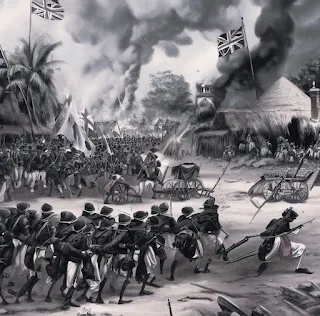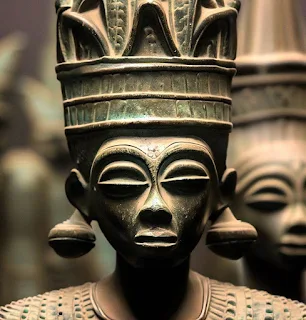British Looting 1897 Punitive Expedition
The British Punitive Expedition happened because the British government wanted to gain control over the region for treasures, economics and strategic reasons.
During the seize on the Kingdom of Benin as part of the British Punitive Expedition beginning January 2, 1897, British forces engaged in widespread looting of its cultural heritage, which included the famous bronze artworks of the Kingdom of Benin.
Looting Artwork and The British Punitive Expedition January 2, 1897 to February 17, 1897
Looting refers to the act of stealing or plundering valuable items, often in a disorderly or violent manner, typically during a time of conflict, crisis, or unrest. On January 2, 1897, a significant historical event occurred, known as the British Punitive Expedition between the British colonial powers and the Kingdom of Benin.
One of the areas of interest for the British was the prosperous Kingdom of Benin, which was located in what is now southern Nigeria. The Kingdom of Benin was a formidable African state and renowned for its rich cultural heritage, especially its intricate bronze sculptures and artworks. These cultural treasures were highly prized, and the British grew interested in gaining control over the region for economic and strategic reasons.
Tensions between the British and the Kingdom of Benin had been simmering for some time because Benin City and its inhabitants were seen as too independent. These tensions primarily revolved around issues related to riches, trade, and territory within Benin's borders. The British accused the Benin rulers of interfering with British economic interests in the area.
Messengers were sent to the King of Benin, advising the Oba of the coming of the British. A decision was made to invade the Kingdom of Benin in response to these escalating tensions and perceived hostilities. In January 1897, the British organized what would later be known as the British Punitive Expedition. This expeditionary force was led by Admiral Sir Harry Rawson, and he was tasked with addressing what the British saw as a hostile regime in Benin.
Admiral Sir Harry Rawson had a military background, primarily in the Royal Navy. Still, he was appointed by the British government to lead the Punitive Expedition to the Kingdom of Benin because he had experience in command, discipline, and organization, adapted to different locations and cultures, and planned operations skills necessary to command the expeditionary force and carry out the mission to address the hostilities and tensions between the British and the Kingdom of Benin.
The British Punitive Expedition reached its climax when by the 17th of February 1897 when the Kingdom of Benin was seized. The conflict was intense but relatively brief, lasting a couple of weeks. Nevertheless, casualties and loss of life did occur as a result of the military engagements and actions during the expedition. During the attack on the Kingdom of Benin, much of its cultural heritage, including its famous bronze artworks, was looted and taken to Britain.
Without concern for cultural heritage, the British authorities dethroned Oba Ovonramwen Nogbaisi forcing him into exile.
The British deposed Oba Ovonramwen Nogbaisi, sending him into exile, and later placed him under house arrest in Calabar, a coastal city in southeastern Nigeria. Deposing the Oba was seen as a means of removing a leader the British considered problematic and replacing him with someone more amenable to British interests. This marked the end of the independent Kingdom of Benin as it was known, and the British established a protectorate over the region.
The Oba of Benin held a central and revered position within the kingdom's political and cultural structure. The Oba was a political leader and a spiritual and cultural head. The Benin had a long and storied history, and the Oba played a pivotal role in maintaining the kingdom's traditions and stability.
Removing the Oba and seizing Benin into a British protectorate meant traditional institutions were undermined, and British colonial authorities exerted control over the region's administration and resources. This seized territory later became part of what is now Nigeria.
Moreover, the looting of Benin's cultural heritage during the British Punitive Expedition of 1897 remains a controversial and emotionally charged issue. In 2014, the University of Aberdeen in Scotland returned a Benin Bronze to Nigeria. In 2019, the Museum am Rothenbaum in Hamburg, Germany, returned a Benin Bronze to Nigeria.
However, the British Museum in London, which holds a substantial collection of Benin Bronzes, has also discussed returning some pieces. These artworks held immense historical, cultural, and artistic value for the Benin people and are considered part of their national heritage.






